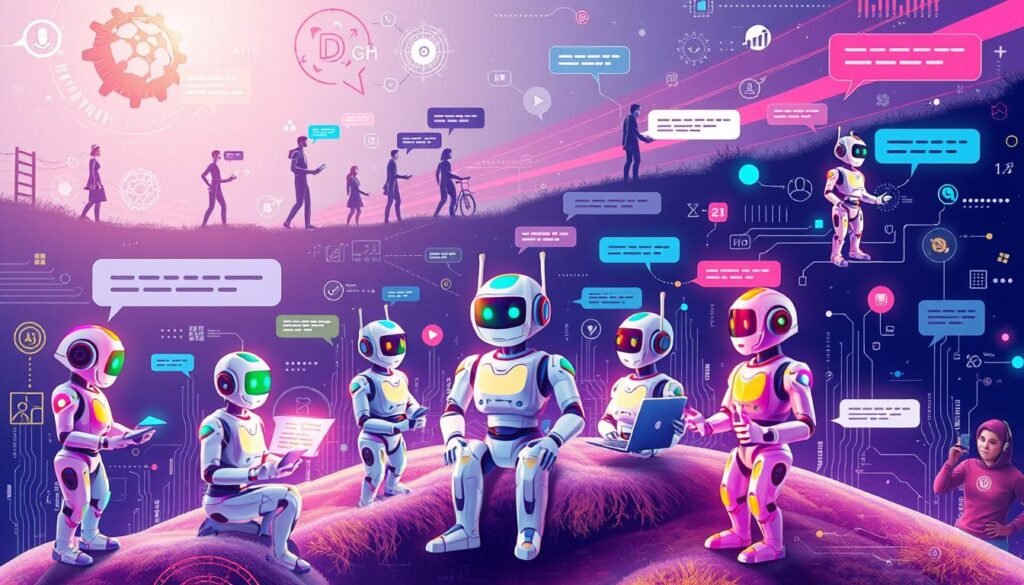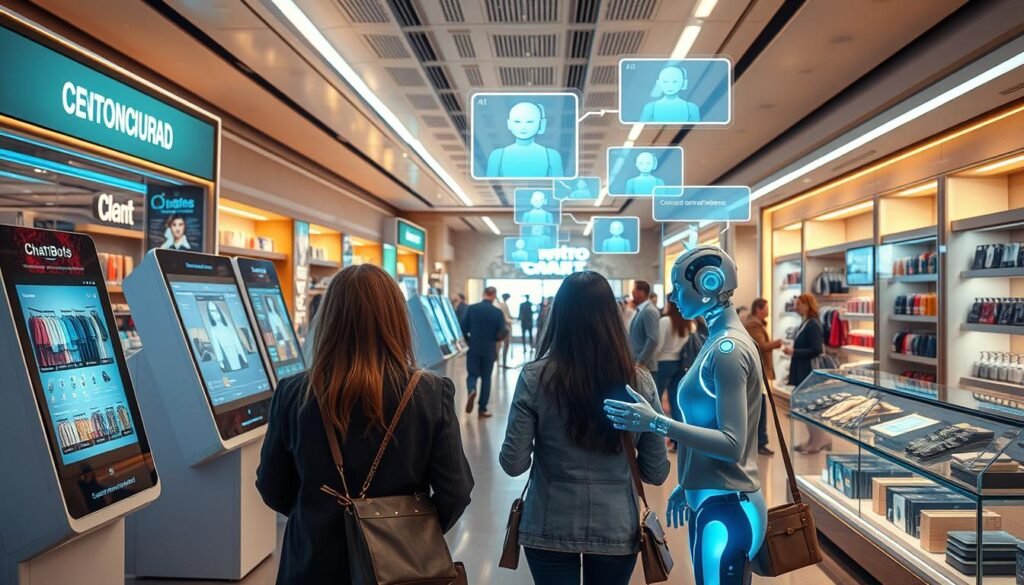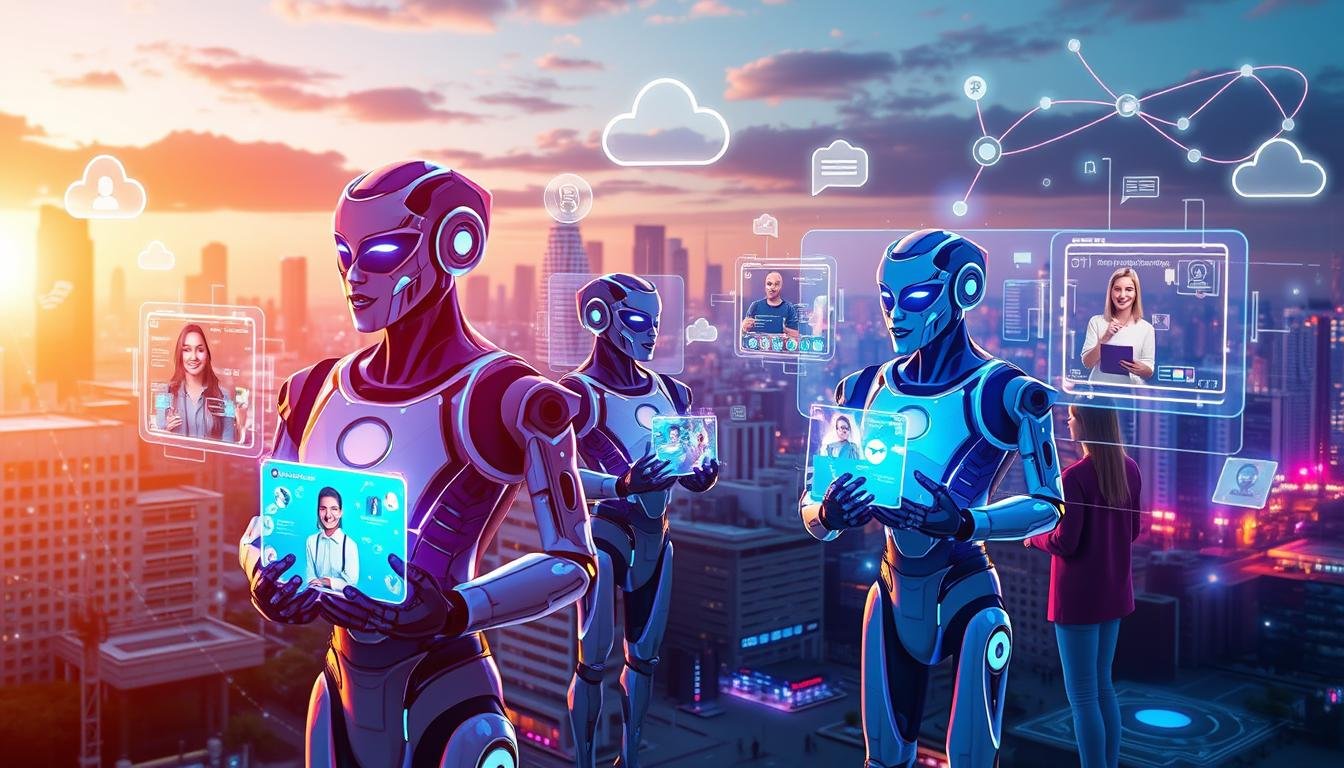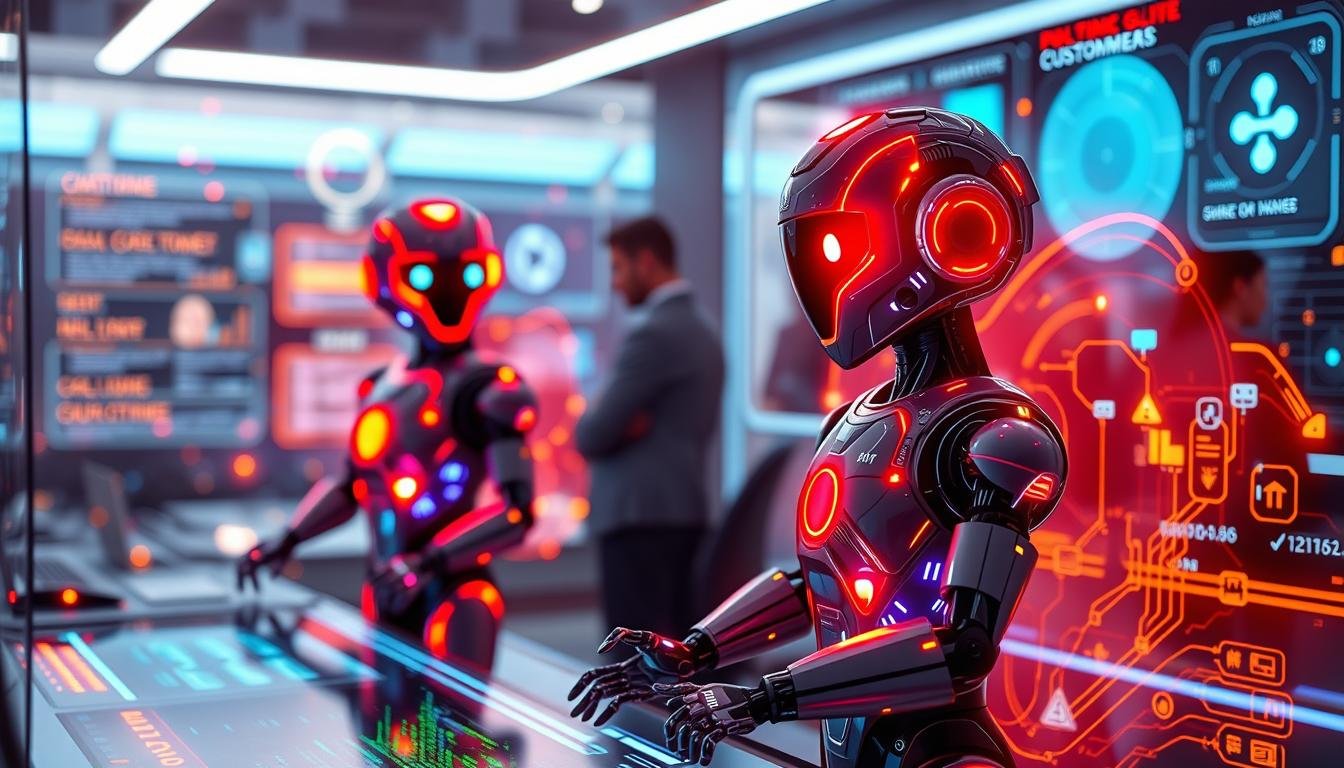In today’s fast world, customer service is key for businesses. People want quick, personal, and helpful support. Companies use AI chatbots to meet these needs.
Machine learning and natural language processing have made chatbots smarter. They help businesses talk to customers better, faster, and more accurately.
The digital world keeps changing, making good customer service more important than ever. Businesses need new ways to keep customers happy and loyal. AI chatbots are a big help, working all the time and handling many questions at once.
Key Takeaways
- AI technologies have revolutionized customer service, providing faster, personalized, and efficient support.
- Advancements in machine learning and natural language processing have enhanced AI capabilities for tailored responses and predictive support.
- AI chatbots offer 24/7 availability, scalability, and the ability to handle multiple queries simultaneously.
- Automated responses ensure accurate information delivery, reducing operational costs and minimizing human error.
- AI-powered chatbots provide instant, consistent assistance across platforms, enhancing convenience and customer satisfaction.
Importance of Customer Service Efficiency in the Digital Age
In today’s fast-paced digital world, customer service is key to success. Companies must meet the demand for quick, personalized, and reliable support. Digital technologies, like AI chatbots, are changing how businesses talk to customers, making experiences better.
Customer Loyalty and Retention
Good customer service boosts satisfaction and keeps customers coming back. 71 percent of customers believe AI and chatbots help them get faster replies. This shows how important quick service is. By using digital tools, businesses can offer 24/7 support and solve problems faster, keeping customers happy and loyal.
Transforming Customer Interactions with Digital Technologies
Digital tools, like AI chatbots, are changing how companies talk to customers. Photobucket saw a three percent increase in customer satisfaction and a 17 percent better first resolution time with chatbots. These tools help meet customer needs for self-service and quick help, ensuring support is always available.
By using digital technologies, businesses can improve customer service and loyalty. This gives them an edge in the competitive market. As the digital age changes what customers expect, companies that focus on AI-powered solutions will do well.
Benefits of AI-Powered Chatbots in Customer Service
In today’s digital world, companies are looking for ways to improve their customer service. AI-powered chatbots have become a key solution. They offer many benefits that can change how customers are treated and make businesses more efficient.
24/7 Availability and Instant Response Times
AI chatbots are great because they’re always ready to help, 24/7. This means customers can get help anytime, not just during business hours. They can handle lots of questions at once, giving quick answers and avoiding long waits.
Consistency and Accuracy in Responses
AI chatbots give consistent and accurate answers to questions. They use a big knowledge base to provide the right info, unlike humans who might give different answers. This makes customers trust and believe in the service more.
Cost Savings and Operational Efficiency
Using AI chatbots can save companies money and make their operations smoother. They take care of simple tasks, letting human agents deal with harder questions. This means companies don’t need to hire as many people, saving on costs. Plus, chatbots help make better decisions by providing useful data.
The advantages of AI chatbots in customer service are clear. They offer 24/7 availability and instant response times. They also give consistent and accurate answers and help save money and improve operations. These virtual helpers are changing how businesses talk to their customers, making the experience better for everyone.

Challenges and Limitations of AI Chatbots
AI chatbots have changed customer service a lot. But, they still face big challenges. One big issue is their ability to handle complex and nuanced customer interactions. They can’t always understand what users mean and give the right answers, especially with unclear questions.
Data privacy and security are also big worries. Since chatbots talk to customers and get personal info, they need strong security. Companies must follow data protection laws to keep customers’ trust and avoid legal problems.
- Handling complex and nuanced customer interactions
- Challenges in understanding user intent and providing appropriate responses
- Data privacy and security concerns
- Compliance with data protection regulations
| Metric | Value |
|---|---|
| AI chatbots in use globally | Projected to reach $27.2 billion by 2030 |
| Potential cost savings for businesses | Millions of dollars annually for large telecom companies |
| Increase in customer satisfaction and loyalty | Significant boost with personalized, context-aware responses |
AI chatbots have many good points like being always available and saving money. But, they can’t deal with all customer needs and have data privacy and security issues. Companies need to think about these problems and find good ways to use AI chatbots right.
“The global AI chatbot market is projected to reach $27.2 billion by 2030, highlighting the immense potential of this technology. However, businesses must be mindful of the challenges and limitations to ensure a seamless and secure customer experience.”
Future Opportunities for AI Chatbots in Customer Service
AI chatbots are getting better and will soon be a big part of customer service. They can now understand and answer complex questions more accurately. This is thanks to new tech in natural language processing and machine learning.
Advancements in Natural Language Processing (NLP)
NLP tech like Named Entity Recognition and Sentiment Analysis helps chatbots talk like humans. They can now get what customers mean and give answers that fit their needs. This makes conversations more natural and helpful.
Integration with Emerging Technologies
AI chatbots will soon work with new tech like augmented reality and the Internet of Things. This will make customer experiences even better. Chatbots will use data from devices to guess what customers need and offer the right help.
As companies focus more on making customers happy, AI chatbots are set to play a big role. They can offer personalized customer experiences and seamless customer experiences. This makes them key to good digital customer service.
“The integration of AI in customer service can lead to improved efficiency and productivity, offering quicker resolution times.”
By using future opportunities for AI chatbots, advancements in natural language processing, and integration with emerging technologies, companies can improve their service. This leads to personalized customer experiences and seamless customer experiences. It keeps customers happy and loyal.
AI-Powered Chatbots: How Businesses are Leveraging AI to Enhance Customer Support
Retail Industry Applications
The retail industry is leading the way in using AI chatbots to improve customer service. These chatbots help with many tasks, like finding products and tracking orders. Sephora, a top cosmetics store, uses a chatbot to give personalized skincare advice and product suggestions.
Chatbots are great for retailers because they work all the time and can talk to many customers at once. This lets human agents focus on harder questions. Also, chatbots collect data that helps retailers understand what customers want, making their services better.
Hospitality Industry Adoption
The hospitality industry is also using AI chatbots to make customer service better. These chatbots help with booking hotels and give guests real-time updates. They work 24/7, so guests can get help anytime without waiting for a person.
More hotels are using chatbots because they make customers happier and help the business run smoother. Chatbots can do lots of things, like suggest places to visit and help with checking in and out. This makes guests more likely to come back.
| Industry | AI Chatbot Applications | Key Benefits |
|---|---|---|
| Retail |
|
|
| Hospitality |
|
|

AI chatbots are making a big difference in retail and hospitality. They help businesses work better, give customers what they want, and learn more about their needs. This makes customer service better and helps businesses grow.
Benefits of Conversational AI in Customer Service
In today’s digital world, more businesses are using conversational AI, or AI chatbots, to boost their customer service. These smart systems bring many advantages that can greatly improve how customers feel and help businesses grow.
Speed and Efficiency
AI chatbots can quickly answer customer questions, cutting down wait times and being available 24/7. This quick service makes customers happier and helps businesses save money.
Personalization
Conversational AI uses customer data and natural language to offer personalized experiences. Chatbots adjust their responses and suggestions to fit each customer, building stronger bonds and loyalty.
Cost-Effectiveness
Using conversational AI for routine tasks can save businesses a lot of money. Chatbots can talk to many customers at once, needing fewer human agents. A study found that using AI in customer service boosted satisfaction by 30% and sales by 20%.
The Conversational AI Market is expected to reach $32.62 billion by 2030, growing over 21.5% annually. Businesses that use this technology well can stay ahead and improve their customer service.
“The use of hyper-personalization in conversational AI has led to a 30% increase in customer satisfaction and a 20% increase in sales for businesses.”
– Deloitte
By adopting conversational AI, businesses can serve customers faster, more personally, and cost-effectively. This leads to more loyal customers and business growth.

Use Cases for AI Chatbots in Customer Service
In today’s digital world, AI chatbots are key to better customer service. They can tackle many tasks, from answering customer questions to helping with sales and bookings. They make customer service more efficient and effective.
Customer Inquiries and Support
AI chatbots are great at solving complex customer problems. They use smart language processing and data access to give quick and accurate answers. This ensures customers get the help they need, anytime, anywhere.
These systems get better with time, making customer service even better. They help improve the overall experience for everyone.
Sales and Marketing
Chatbots are also important in sales and marketing. They offer personalized product suggestions and help with upselling. By understanding what customers like, they can suggest the right products, boosting sales and engagement.
Booking and Reservations
In the hospitality world, AI chatbots are a big help with bookings. They check availability, help with reservations, and keep customers updated. This makes the booking process smooth and efficient, improving customer happiness and business operations.
As AI chatbots grow in use, businesses can improve their customer service and operations. They offer personalized support, making customers happy and loyal. This helps businesses grow and succeed in the digital age.
“AI-powered chatbots have revolutionized the way businesses approach customer service, enabling them to automate tasks, personalize interactions, and ensure consistent support across various channels.”
Customer Service AI: Balancing Automation and Human Touch
Businesses use AI chatbots to make customer service faster. But, sometimes, customers need a real person for complex issues or emotional support. Keeping a personal connection with customers is key to a better experience and loyalty.
Maintaining a Personal Connection
Even the best chatbots can’t meet all customer needs. Customers often want empathy and personal attention from humans for sensitive issues. By mixing chatbots and human support, businesses can make customers feel valued and heard.
Enhancing the Customer Experience
Combining AI and human service improves the customer experience. Chatbots handle simple tasks, letting humans focus on complex issues and emotional support. This way, businesses offer speed and consistency with a personal touch.
| Metric | Value |
|---|---|
| Automation Rate | 70% |
| Resolution Rate | 85% |
| Efficiency Improvement | 30% |
| 24/7 Support | Yes |
| Resolution Time | 2 minutes |
| Comprehensive Support | Yes |
| Team Productivity Boost | 40% |
| Task Distribution | 75% automated, 25% human |
| Interactive Features | Yes |
| User Guidance | Yes |
| Multilingual Capabilities | Yes |
| 14-Day Trial | Yes |
| Platform Integration | Yes |
| Channel Integration | Yes |
| Ready-to-Use Templates | Yes |
By balancing automation and human touch, businesses can offer efficient and personalized service. This approach improves the customer experience, builds loyalty, and encourages advocacy.
Conclusion
AI-powered chatbots have changed the game in customer service. They bring many benefits like better efficiency and cost savings. They also offer personalized interactions and are available 24/7.
But, it’s key to use both AI and human agents wisely. AI chatbots are great for simple questions, but humans are better for complex issues. This mix ensures customers get the best service.
The future of customer service looks bright with AI. Advances in natural language processing and new tech, like AI-powered chatbots, will keep improving. Businesses that use these tools well will build strong customer relationships and grow.






